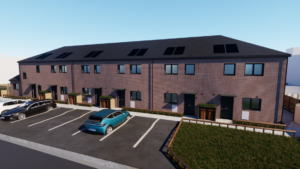Can collaborative leadership reduce stress on frontline housing professionals?
 Collaboration is good for communities and frontline workers, but it’s not an easy process. Dominic Macdonald-Wallace offers a step by step approach.
Collaboration is good for communities and frontline workers, but it’s not an easy process. Dominic Macdonald-Wallace offers a step by step approach.
The Frontline Futures report last week stated that housing staff are increasingly expected to fill the gap left by the withdrawal of other services. There is also evidence that stepping into that vacuum without the skills and knowledge to be effective is taking a toll on our colleagues as they support stressed residents.
The concern is that housing professionals will adopt the typical ‘heroic leadership’ approach, based on the misconception that only they can sort out the problem. However the academic evidence is that they will be far more effective if they harness the power of collaborative leadership to bring together partners and the community to work on the problem either with them, or even for them. But the reality is that partnership working and community participation will not happen spontaneously. Someone has to step forward and initiate the process and that has three steps.
Step 1: Initiating engagement
Housing professionals who step into the partnership and community arena must be clear on the purpose for doing so, they must galvanise other organisations to work together on a common engagement process (no organisation commands the sole right to lead communities), recruit and mobilise active citizens and create a safe space where together they can conceptualise the challenges they wish to address.
Good engagement can lead to better outcomes. Poor engagement and participation creates mistrust, wastes time and money, and can seriously undermine future attempts at community engagement.
Step 2: Enterprising communities
The second step in the collaborative engagement process is to ‘access all areas’ of the wider community’s skills, knowledge and resources to help transform services and enhance community resilience. Using asset-based approaches and the notion of co-production there are four main approaches to community participation, namely:
1. Community co-design
2. Community co-delivery
3. Community do-decide
4. Community self-delivery
All of these can help to tap into the enterprising talents, ideas and energies found within partners and across your local communities.
Step 3: Collaborative empowerment
The third step in the collaborative engagement process demands that collaborative leaders be the catalysts of change within their communities. Recalibrating the relationship between public purpose institutions and their communities is a two-way street. So, for this new relationship to flourish, public purpose institutions need to understand why they must ‘let go’ of certain resources and powers to create the space whereby empowered partnerships and communities can step up and be a partner in the transformation of better public services.
So, collaborative leadership demands a wide set of skills. However they can be learned. A good starting point for housing professionals may be to refresh their skills in recruitment, development and retention of community Changemakers. These are competent community volunteers who can work on the projects and programmes with housing professionals and other partnering organisations to deliver far more than an individual can achieve on their own.
But who are these people? The name Changemakers came out of an RSA report on Peterborough Council’s project to engage more residents in community activity. The review of the project by the RSA identified that those who came forward to join the various projects were not just from the housing estates. Members of the clergy, artists, head teachers, social entrepreneurs, charity workers, police officers, members of the local chamber of commerce, representatives from the local primary care trust, businessmen and council officers all gave volunteer time to their community. All were found to be adept at driving positive change in their local areas and, the report states that many possessed an ‘impressive repertoire of capabilities and are instilled with an appetite to apply their skills and experience to address local issues beyond their day job.’
In his paper ‘It’s Co-operation Stupid’ Charles Leadbeater from IPPR refutes the argument that humans are genetically programmed to be selfish. He suggests that humans are first and foremost, reciprocators and conditional co-operators. But, that people are more likely to cooperate when the conditions are right. Drawing on good practice across the study of volunteer management and other sources, he provides a check-list to develop community cooperation. Changemakers are more likely to cooperate when:
1. The activity is framed in a way that encourages co-operation
2. There is a reliable framework of fairness, including effective sanctions for community volunteers who do not participate appropriately
3. People are able to rely on norms of reciprocity and peer-to-peer learning to enforce sanctions, rather than material incentives and abstract rules, both of which tend to undermine cooperation
4. There are lots of opportunities for communication, including face-to-face, to make co-operation feel personal and establish a sense of empathy and shared purpose
5. It is easy for co-operators to find one another because they are acting out in the open
6. People can build up a valued reputation as people who can be trusted to do their fair share of the work
7. People feel that others are part of the same group.
Leadbeater’s conditions are supported by the RSA, who state that people, given the space, the right circumstances and the necessary skills, would be ‘far more willing to close their social aspiration gap; that gap between the kind of society we wish to live in and the one in which we find ourselves based on our current behaviours’.
Therefore housing professionals who see only stress and a bigger workload in stepping into what seems like a vacuum of support for the tenants they care about, could start by drawing on Leadbeater’s seven conditions above. They could be a starting point for building the attractive environment that will bring the skilled Changemakers to the table to share the load.















